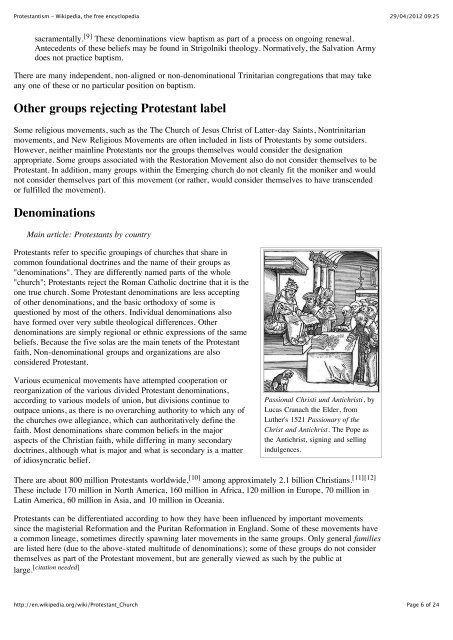Protestantism - Wikipedia, the free encyclopedia
Protestantism - Wikipedia, the free encyclopedia
Protestantism - Wikipedia, the free encyclopedia
Create successful ePaper yourself
Turn your PDF publications into a flip-book with our unique Google optimized e-Paper software.
<strong>Protestantism</strong> - <strong>Wikipedia</strong>, <strong>the</strong> <strong>free</strong> <strong>encyclopedia</strong><br />
Certain Protestant denominations including <strong>the</strong> Quakers and <strong>the</strong> Shakers, do not practice baptism<br />
sacramentally. [9] These denominations view baptism as part of a process on ongoing renewal.<br />
Antecedents of <strong>the</strong>se beliefs may be found in Strigolniki <strong>the</strong>ology. Normatively, <strong>the</strong> Salvation Army<br />
does not practice baptism.<br />
There are many independent, non-aligned or non-denominational Trinitarian congregations that may take<br />
any one of <strong>the</strong>se or no particular position on baptism.<br />
O<strong>the</strong>r groups rejecting Protestant label<br />
Some religious movements, such as <strong>the</strong> The Church of Jesus Christ of Latter-day Saints, Nontrinitarian<br />
movements, and New Religious Movements are often included in lists of Protestants by some outsiders.<br />
However, nei<strong>the</strong>r mainline Protestants nor <strong>the</strong> groups <strong>the</strong>mselves would consider <strong>the</strong> designation<br />
appropriate. Some groups associated with <strong>the</strong> Restoration Movement also do not consider <strong>the</strong>mselves to be<br />
Protestant. In addition, many groups within <strong>the</strong> Emerging church do not cleanly fit <strong>the</strong> moniker and would<br />
not consider <strong>the</strong>mselves part of this movement (or ra<strong>the</strong>r, would consider <strong>the</strong>mselves to have transcended<br />
or fulfilled <strong>the</strong> movement).<br />
Denominations<br />
Main article: Protestants by country<br />
Protestants refer to specific groupings of churches that share in<br />
common foundational doctrines and <strong>the</strong> name of <strong>the</strong>ir groups as<br />
"denominations". They are differently named parts of <strong>the</strong> whole<br />
"church"; Protestants reject <strong>the</strong> Roman Catholic doctrine that it is <strong>the</strong><br />
one true church. Some Protestant denominations are less accepting<br />
of o<strong>the</strong>r denominations, and <strong>the</strong> basic orthodoxy of some is<br />
questioned by most of <strong>the</strong> o<strong>the</strong>rs. Individual denominations also<br />
have formed over very subtle <strong>the</strong>ological differences. O<strong>the</strong>r<br />
denominations are simply regional or ethnic expressions of <strong>the</strong> same<br />
beliefs. Because <strong>the</strong> five solas are <strong>the</strong> main tenets of <strong>the</strong> Protestant<br />
faith, Non-denominational groups and organizations are also<br />
considered Protestant.<br />
Various ecumenical movements have attempted cooperation or<br />
reorganization of <strong>the</strong> various divided Protestant denominations,<br />
according to various models of union, but divisions continue to<br />
outpace unions, as <strong>the</strong>re is no overarching authority to which any of<br />
<strong>the</strong> churches owe allegiance, which can authoritatively define <strong>the</strong><br />
faith. Most denominations share common beliefs in <strong>the</strong> major<br />
aspects of <strong>the</strong> Christian faith, while differing in many secondary<br />
doctrines, although what is major and what is secondary is a matter<br />
of idiosyncratic belief.<br />
http://en.wikipedia.org/wiki/Protestant_Church<br />
Passional Christi und Antichristi, by<br />
Lucas Cranach <strong>the</strong> Elder, from<br />
Lu<strong>the</strong>r's 1521 Passionary of <strong>the</strong><br />
Christ and Antichrist. The Pope as<br />
<strong>the</strong> Antichrist, signing and selling<br />
indulgences.<br />
There are about 800 million Protestants worldwide, [10] among approximately 2.1 billion Christians. [11][12]<br />
These include 170 million in North America, 160 million in Africa, 120 million in Europe, 70 million in<br />
Latin America, 60 million in Asia, and 10 million in Oceania.<br />
Protestants can be differentiated according to how <strong>the</strong>y have been influenced by important movements<br />
since <strong>the</strong> magisterial Reformation and <strong>the</strong> Puritan Reformation in England. Some of <strong>the</strong>se movements have<br />
a common lineage, sometimes directly spawning later movements in <strong>the</strong> same groups. Only general families<br />
are listed here (due to <strong>the</strong> above-stated multitude of denominations); some of <strong>the</strong>se groups do not consider<br />
<strong>the</strong>mselves as part of <strong>the</strong> Protestant movement, but are generally viewed as such by <strong>the</strong> public at<br />
large. [citation needed]<br />
29/04/2012 09:25<br />
Page 6 of 24


